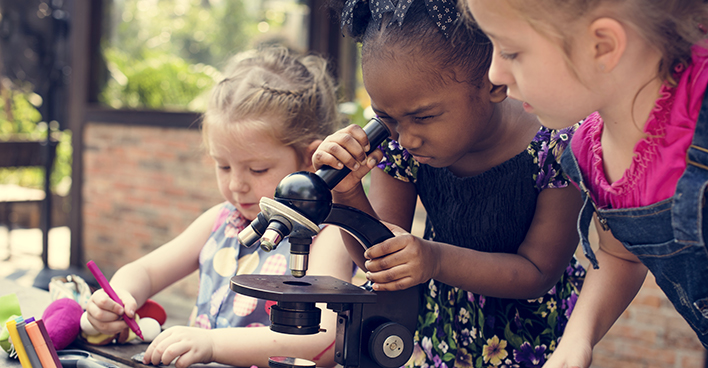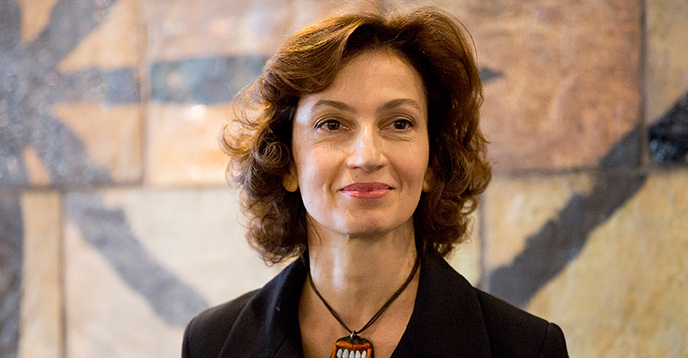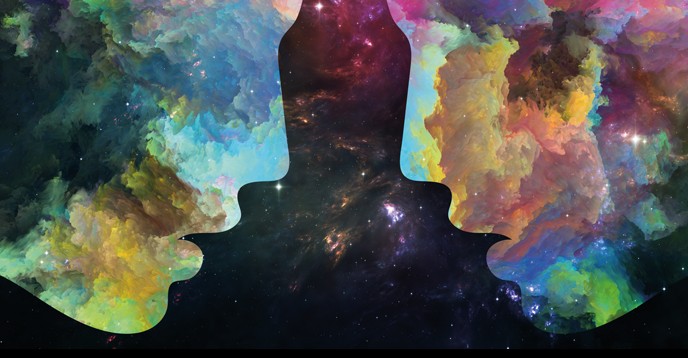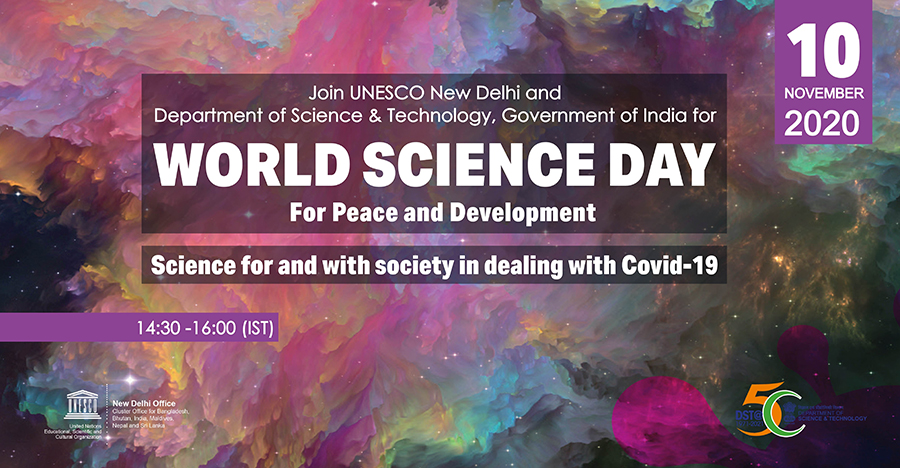World Science Day for Peace and Development

Science for and with Society
Celebrated every 10 November, World Science Day for Peace and Development highlights the important role of science in society and the need to engage the wider public in debates on emerging scientific issues. It also underlines the importance and relevance of science in our daily lives.
By linking science more closely with society, World Science Day for Peace and Development aims to ensure that citizens are kept informed of developments in science. It also underscores the role scientists play in broadening our understanding of the remarkable, fragile planet we call home and in making our societies more sustainable.
In 2020, at the time when the global COVID-19 pandemic further demonstrated the critical role of science in addressing global challenges, the focus of the World Science Day is on Science for and with Society. To celebrate the 2020 World Science Day, UNESCO will organize an online roundtable on the theme of “Science for and with Society in dealing with COVID-19”.
Join the conversation with the hashtag #ScienceDay.
Science for and with Society in dealing with COVID-19
6 November 2020, 1 pm to 3 pm (GMT+1)
To celebrate the 2020 World Science Day for Peace and Development, UNESCO will organize an online roundtable.
What UNESCO does for science for peace and development
About the 2020 commemoration
Events 2020

Science for and with Society in dealing with COVID-19 - Roundtable. Paris, France, 6 November
News
 Edith Heard: In order to protect life, we must first understand it
Edith Heard: In order to protect life, we must first understand it UNESCO, WHO and the UN High Commissioner for Human Rights call for “open science”
UNESCO, WHO and the UN High Commissioner for Human Rights call for “open science” Jennifer Doudna and Emmanuelle Charpentier win 2020 Nobel Prize in Chemistry
Jennifer Doudna and Emmanuelle Charpentier win 2020 Nobel Prize in Chemistry Milestone in UNESCO’s development of a global recommendation on Open Science
Milestone in UNESCO’s development of a global recommendation on Open Science
2020 theme: Science for and with Society
This year, at a time when the world is struggling with the global COVID-19 pandemic, the focus of the World Science Day is on “Science for and with Society in dealing with the global pandemic”.
Throughout this unprecedented heath and sanitary crisis, UNESCO has endeavoured to bring science closer to society and to bolster the critically needed international scientific collaborations. From the science perspective, UNESCO’s response to COVID-19 is structured around three major pillars: promoting international scientific cooperation, ensuring access to water and supporting ecological reconstruction.
Promoting international scientific cooperation
To tackle the COVID-19 pandemic, it is imperative to strengthen international and national scientific cooperation, as well as the dialogue between scientists, policymakers, private practitioners, industries and health professionals, civil society and public at large. This calls for open access to scientific knowledge and know-how, data sharing and evidence-based policy and decision making and an urgent transition to Open Science globally.
Improving access to water and sanitation
Access to clean and safe water and sanitation is critical and is indispensable to avoid the spread of COVID-19 and to fight the pandemic. UNESCO provides scientific and technical advice and builds capacity for evidence-based and inclusive water policies and for the sustainable management of water resources towards ensuring access to clean and safe water and sanitation for all.
Supporting ecological reconstruction
The pressure on biodiversity and its natural habitats favour the emergence of zoonoses such as COVID-19. More than ever, there is a need to rethink the links between people and nature. UNESCO’s designated sites, such as Biosphere Reserves and Global UNESCO Geoparks, are powerful tools for bringing people closer to nature by testing and applying integrated approaches to biodiversity conservation and sustainable use and sustainable development.
Let us embrace open science as a tool for making science more accessible, scientific process more inclusive and the outputs of science more readily available for all!
Fostering a global dialogue on open science
UNESCO is leading a global dialogue on Open Science, to ensure that Open Science practices meet their potential in bridging the world’s STI gaps and enabling sustainable development.
Message by the Director-General
"The current crisis should serve as a wakeup call regarding the urgency for increased financing and support of scientific research and collaboration. This concerns not only the natural sciences, but also the social and human and sciences. The virus is an all-encompassing societal issue, irreducible to epidemiological data alone, however fundamental they may be."
— Audrey Azoulay, Director-General of UNESCO
Message on the occasion of World Science Day for Peace and Development 2020
Full message in PDF format:
English ǀ Français ǀ Español ǀ Русский ǀ العربية ǀ 中文
Rountable: Science for and with Society in dealing with COVID-19
To celebrate the 2020 World Science Day for Peace and Development, UNESCO organized an online roundtable to share good practices and new ideas for improving the interlinkages between science and society to resolve global challenges such as the current pandemic.
- Event programme (pdf)
Video of the event:
Resources
Poster

- Download the poster:
English | Français | Español | Blank version for translations (high resolution pdf)
English | Français | Español | Blank version (low resolution jpg)
What can you do?
 The success of the World Science Day for Peace and Development will depend on the active involvement of many partners such as intergovernmental and non-governmental organizations, scientific and research institutions, professional associations, the media, science teachers and schools.
The success of the World Science Day for Peace and Development will depend on the active involvement of many partners such as intergovernmental and non-governmental organizations, scientific and research institutions, professional associations, the media, science teachers and schools.
Different activities will be undertaken to mobilize support for the objectives of the World Science Day for Peace and Development.
We invite you and your organization to celebrate this Day with some special events or action. Next, you can find a list of potential actions that can be undertaken by you and your organization:
-
SPREAD THE WORD
- diffuse World Science Day for Peace and Development in your institution or in your town, city or local community, through municipal and state government channels.
- incorporate the messages of World Science Day for Peace and Development into official speeches, publications and other activities taking place on 10 November.
- contact national and local media (TV, radio, print, electronic) to highlight the importance of celebrating WSDPD at national and local level.
- write articles and letters about the importance of science for sustainable societies to the media, including industry trade journals, organization newsletters, and school newspapers.
-
ORGANISE
- an 'Open Day' in your institution to highlight the importance of science for peace and development.
- classroom discussions to emphasize the many different ways science and technology touch our daily lives.
- conferences and forums.
- a science museum visit.
-
CONNECT
- visit local schools to speak about careers in science, deliver scientific presentations or demonstrations to young students.
- build classroom-to-classroom connections between schools via the Internet to talk about science projects that will interest young people.
- find a sister institution and carry out a joint activity highlighting the importance of science.
- invite university faculty to join with community organizations and schools to celebrate the Day.
We would be grateful if you could keep us informed on the activities you will organize in order to include your events on this website.
The registration is closed.
Contacts: i.brugnon@unesco.org ; a.barbash@unesco.org
Azerbaijan
First name: Famil
Last Name: Mustafa
Organization: Tusi-Bohm Planetarium
Email: famil.mustafa@planetarium.az
Telephone number: +504400755
Event title: Science For All
Type of event: Public
Event description: open doors for planetarium and observatory museum, public talks, public night sky observations
Website: https://www.facebook.com/Tusi.Bohm.Planetarium/
Date of your event: 11/10/2019
Event venue: Tusi-Bohm Planetarium
Postal address: Central Post Office, P.O.BOX 52
Area code: 994
City: Baku
Country: Park Bulvar MALL, AZ 1000 Baku, Azerbaijan
Bangladesh
First name: Asif
Last Name: Mahmud Arnob
Organization: Bangabandhu Sheikh Mujibur Rahman Maritime University
Email: asifmahmudarnob@gmail.com
Telephone number:
Event title: Science today and tomorrow
Type of event: It a multi purpose event ensuring science activities for all learners
Event description: "Science today and tomorrow" is an event where all crazy science maniac and genius gather together.It creates awareness among us about the daily science usage in our life.There is Science project competition, Science talk session and showcasing science.
Website: https://mobile.facebook.com/maritime.industry.analysis.busin...
Date of your event: 11/10/2019
Event venue: House 12, Road 3/A, Sector 9, Uttara, Dhaka
Postal address: House 12, Road 3/A, Sector 9, Uttara, Dhaka
Area code: 1230
City: Dhaka
Country: House12, Road 3/A, Sector 9, Uttara, Dhaka, Plot 14/06-14/23, Pallabi, Mirpur-12, Dhaka 1216, Bangladesh
Indonesia
First name: Citius
Last Name: Vienny
Organization: Forum of Scientist Teenagers
Email: kir_fosca@yahoo.co.id
Telephone number:
Event title: Science Competition and National Seminar World Science Day 2019
Type of event: Science Competition and National Seminar
Event description: FOSCA ft. SMAN 66 Jakarta are presenting 2019 world international science day for Indonesia. With the theme "power of science and open science, leaving no one behind". FOSCA is trying to become a communication forum for the teen scientist in Indonesia
Website: wsd.kirfosca.com
Date of your event: 09/11/2019
Event venue: SMAN 66 Jakarta and Museum Mandiri Jakarta
Postal address: d/a HAAJ Planetarium dan Observatorium Jakarta, Jl Raya Cikini No.73 Menteng Jakarta 10330
Area code: +62
City: Jakarta
Country: Jl. Bango III, RT.7/RW.3, Pd. Labu, Kec. Cilandak, Kota Jakarta Selatan, Daerah Khusus Ibukota Jakarta 12450, South Jakarta, JK, 12450, Indonesia
Italy
First name: Giuliana
Last Name: Catara
Organization: Institute of Biochemistry and Cell Biology - National Council of Research, Napoli , Italy
Email: giuliana.catara@ibbc.cnr.it
Telephone number: +816132565
Event title: Life Sciences for Global Sustainable Development
Type of event: Interactive seminars, discussions and laboratories on specific biotechnological topics
Event description: The event, held at Institute of Biochemistry and Cell Biology of National Council of Research in Naples (Italy), aims at implementing the understanding of Life Sciences and Biotechnologies focusing on those dedicated to human health. Secondary grade students will be engaged in interactive seminars and laboratories through a "Hands On " approach. The goal is that of promoting the understanding the present significance and the future perspectives offered by biotechnologies in preserving and improving human health to the benefit of the community.
Website: www.ibp.cnr.it or www.ibbc.cnr.it
Date of your event: 14/11/2019
Event venue: Institute of Biochemistry and Cell Biology National Council of Research , V. P. Castellino, 111 Napoli, Italy
Postal address: V. Pietro Castellino, 111 Napoli, Italy
Area code:
City: Napoli
Country: Institute of Biochemistry and Cell Biology, National Council of Research, V. Pietro Castellino, 111 Napoli, Italy 80131 Napoli NA Italy
Luxembourg
First name: Patrick
Last Name: Michaely
Organization: National Museum of Natural History Luxembourg
Email: patrick.michaely@mnhn.lu
Telephone number: 462233433
Event title: Science Festival 2019
Type of event: Science Festival
Event description: "The purpose of the Science Festival is to present and promote science and research in Luxembourg and to encourage young people and the general public to become interested in and curious about science and technology. The Science Festival is attracting more and more visitors with every new edition and it has now become an annual event not to be missed. During two days primary and secondary school classes participated, after registration, in the numerous workshops and shows, which were presented to them by research institutes, associations as well as volunteers. On weekend the Science Festival was open to the general public.
Website: www.science-festival.lu
Date of your event: 10/11/2019
Event venue: National Museum of Natural History Luxembourg & Centre de rencontre Abbaye de Neumünster
Postal address: 25-28 rue Münster
Area code: 2160
City: Luxembourg
Country: 25-28 rue Münster, Luxembourg, 2160, Luxembourg
Tunisia
First name: Sahah
Last Name: Nasr
Organization: Monastir Sciences Palace
Email: salah1nasr1@gmail.com
Telephone number: 73463556
Event title: Open science, leaving no one behind
Type of event: Open day
Event description: "Monastir Science Palace (MSP) is a non-governmental scientific establishment that focuses on technology, environment, and education. The MSP’s main mission is to create an intellectual, cultural, and scientific dynamic among different categories of citizens. It facilitates the transition of scientific information to the public by explaining the integration of science and technology in their daily lives. This year’s theme “Open science, leaving no one behind” is the principal goal of our establishment, because we are mainly focusing on:
- Contribute in spreading scientific concepts in a simple and attractive way.
- Create an intellectual, cultural and scientific dynamics among the different categories of citizens.
- Provide the scientific knowledge to pupils in remote areas of Tunisia.
- Facilitate the scientific learning for people with special needs.
The Monastir Science Palace, organizes an Open Day to celebrate the World Science Day for Peace and Development in cooperation with many scientific associations. Together they aim to spread the knowledge in order to keep larger segments of society up-to-date with the scientific and technological innovations."
Website: www.psm.rnu.tn
Date of your event: 10/11/2019
Event venue:
Postal address: BP.63-Rue Farhat Hached
Area code: 5000
City: Monastir
Country: Rue Farhat Hached, Monastir, 5000, Tunisia
Ukraine
First name: Kseniia
Last Name: Minakova
Organization: NTU "KhPI"
Email: friday.marjory.johnes@gmail.com
Telephone number:
Event title: Science is FUN!
Type of event: Science Festival
Event description: "November 17, on the occasion of the UNESCO World Science Day Celebration, for anyone who shares our view of the need to connect science and society, seeks to share scientific knowledge and promote youth involvement in science, technology and innovation at NTU "KhPI" Open Day and Science Festival "Science is FUN!"
On November 17, the Science is FUN!
- Robotics and Engineering Zone
- Laboratory-experimental zone
- WORKSHOP Area
- Lecture hall: motivational and scientific-educational lectures
- Performances by Rock bands
NTU "KhPI" Open Day Program and Science Festival "Science is FUN!"
- Acquaintance with NTU "KhPI".
- Motivational lectures from graduates of NTU "KhPI" «How to achieve success up to 30 years».
- Experiements and workshops in laboratory-experimental, robot-engineering and workshop area.
- Quizz in physics, mathematics, chemistry, biology and languages.
- Motivational and scientific lectures.
- Discussion panel: "Professions of the future".
- Presentations of innovative educational projects of NTU "KhPI".
- Performances of rock bands: Rebel Yell (Cover-band), VL8 (Rock-band). The sound alive.
And that's not all!!!"
Website: http://events.kpi.kharkov.ua/event/open-day/
Date of your event: 17/11/2019
Event venue: Sports Complex Politekhnik
Postal address: Kyrpychova str. 2
Area code: 61002
City: Kharkiv
Country:Alchevskyh St, 50а, Kharkiv, 63, 61002, Ukraine
 Science Centres and Science Museums around the world are celebrating the contribution of science for sustainable development on this day - join them for special events on World Science Day for Peace and Development.
Science Centres and Science Museums around the world are celebrating the contribution of science for sustainable development on this day - join them for special events on World Science Day for Peace and Development.
Science, a Human Right
Everyone has a right to participate in and benefit from science. We must find ways to improve access to science and to the benefits of science for sustainable development.
Universal Declaration of Human Rights
The Declaration was proclaimed by the United Nations General Assembly in Paris on 10 December 1948 as a common standard of achievements for all peoples and all nations. It sets out, for the first time, fundamental human rights to be universally protected. Article 27 states that:
(1) Everyone has the right freely to participate in the cultural life of the community, to enjoy the arts and to share in scientific advancement and its benefits.
(2) Everyone has the right to the protection of the moral and material interests resulting from any scientific, literary or artistic production of which he is the author.
UNESCO Recommendation on Science and Scientific Researchers
The UNESCO Recommendation on Science and Scientific Researchers is an important standard-setting instrument which not only codifies the goals and value systems by which science operates, but also emphasizes that these need to be supported and protected if science is to flourish. A first Recommendation was adopted in 1974, and a revised Recommendation was adopted on 13 November 2017, superseding the 1974 text. This Recommendation has a particular value today, including for developing countries in building up their scientific skills and institutions.
The Recommendation upholds the principles of the Universal Declaration of Human Rights - that everyone has the right to participate in and benefit from science - and provides a useful checklist of political and institutional requirements to ensure access to science education, and fundamental rights such as the right to be a scientists, to protect intellectual property, to share scientific advancements and accademic freedom.
Message from HRH Princess Sumaya bint El Hassan, UNESCO Special envoy for Science for Peace
"Science is our best hope for a bright and equitable future. The challenges are grave, and we must all work together to tackle them. We must share our knowledge and support one another so that we may realize our full protential as a human family."
— HRH Princess Sumaya bint El Hassan, UNESCO Special envoy for Science for Peace
Background
From the universe expanding to the phones in our pockets, science is everywhere. Each year, on 10 November, the World Science day for Peace and Development helps us remember this fact and offers an opportunity for everyone to engage in scientific debates and activities.
The Day marks an occasion to mobilize all actors around the topic of science for peace and development – from government officials to the media to school pupils. By linking science more closely with society, science is made accessible to all and broadens our understanding of the remarkable, fragile planet we call home. It becomes also a more solid stepping-stone towards making our societies more sustainable.
Since its proclamation by UNESCO in 2001, World Science Day for Peace and Development has generated many concrete projects, programmes and funding for science around the world. The Day has also helped foster cooperation between scientists living in regions marred by conflict, one example being the UNESCO-supported creation of the Israeli-Palestinian Science Organization (IPSO).
The objectives of World Science Day for Peace and Development are to:
- Strengthen public awareness on the role of science for peaceful and sustainable societies;
- Promote national and international solidarity for shared science between countries;
- Renew national and international commitment for the use of science for the benefit of societies;
- Draw attention to the challenges faced by science and raising support for the scientific endeavour.
Previous celebrations
- 2019: Open Science, leaving no one behind
- 2018: Science, a Human Right
- 2017: Science for global understanding
- 2016: Celebrating science centres and science museums
- 2015: Science for a Sustainable Future
- 2014: Quality Science Education: ensuring a sustainable future for all
- 2013: Science for Water Cooperation: Sharing Data, Knowledge and Innovations
- 2012: Science for global sustainability: interconnectedness, collaboration, transformation
- 2011: Towards green societies
- 2010: Science for the rapprochement of peoples and cultures
- 2009: Astronomy, in celebration of the International Year of Astronomy
- 2008 Celebration
- 2007: Investing in science: investing in knowledge
- 2006 Celebration
- 2005 Celebration
- 2004 Celebration
- 2003: Science as an instrument of peace
- 2002 Celebration


















